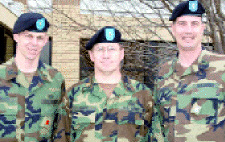
LAWTON, Okla. (BP)–As the prospect of a new war in the Middle East grows, activity at Fort Sill here in the shadow of the Wichita Mountains is at a fever pace. And, for almost half of the 14,000 or so military personnel assigned to the post, the scurry of activity relates directly to the possibility of deployment to what the Army terms “an austere” theatre of operations.
The 7,000 or so soldiers on alert make up the bulk of III Corps Artillery, the Army’s largest, most diverse field artillery organization, which includes four brigades with 14 battalions, and a corps artillery headquarters. Its soldiers are combat-ready to go anywhere, anytime.
During the Persian Gulf War, III Corps Artillery units were among the first to deploy to the region, and were in the forefront of the fighting. Now, even as material and troops are prepared for deployment to a possible new gulf conflict, unit chaplains are themselves busy gathering ministry materials and helping to prepare the soldiers and their families for the impending separation. Three of those chaplains, Maj. Matthew Goff, Capt. Kevin Forrester and Capt. Andy Taylor, BGCO board member and most recently pastor at Chickasha, Trinity, said the movement of troops overseas opens a huge door of opportunity for churches to minister.
“We have a chance to reach out to a lot of folks,” said Forrester, who serves the 2nd battalion, 18th Field Artillery regiment. “It’s going to come down to our people becoming intentional and looking for opportunities to help. I feel there is no other group more uniquely qualified to touch people’s lives in times like this than the local church.” While the Army always organizes Family Resource Groups to help the families left at home, and leaves a small rear detachment of each unit behind, church bodies are uniquely qualified to help, Taylor, who serves the 6th Battalion, 27th Field Artillery regiment, pointed out.
“To put it in Baptist terms, church members can help these families in the same way they help each other — through their Sunday School classes or Bible study groups,” he said. The chaplains said many of the soldiers are leaving behind young spouses with sometimes as many as four young children to take care of.
“Many times, they don’t have a good, strong family relationship back home, so returning there is not an option,” Forrester said, “and they’re not a member of a church here, so they don’t see the church as a resource. So, this is a chance for the church to change that perception and to put the commandment, ‘love your neighbor as yourself,’ into practice and make a real difference in the lives of these people.” The chaplains said churches need to “have open eyes and ears” to recognize those in need.
“Churches just need to be aware that there may be national guard or reserve members in their congregation, even if they don’t actually serve in your town,” Taylor said. “Many times, guard units are made up of men and women who don’t live in the town the unit is headquartered in, so just because your town doesn’t have a national guard unit doesn’t mean you don’t have people serving.”
“Deployment of guard and reserve units presents some real opportunities, as well as challenges, for churches to be alert and pray that God will let them see those who are in need,” Forrester added. Of course, the most obvious way churches can help is to pray for the soldiers while they are overseas and their families left behind. But, adding a personal touch can work wonders, Forrester said — and that includes ministering to the chaplains and their families as well.
“Reaching out and touching the spouse and family with a phone call or note has always helped,” he said. “Also, I think a big opportunity for churches is to send ministry support items, such as Bibles, devotional materials and Sunday School literature to help us minister to the soldiers while we’re overseas.”
Other helpful items include cookies and other treats, as well as powdered fruit drinks.
“It’s amazing what a cup of Gatorade, for example, can do for ministry, especially if you’re in an austere environment,” Forrester said. Goff added that letters to service personnel are crucial to help keep morale up. “That’s an area where church members can touch a lot of lives,” he said. “Just to know that someone they don’t even know cares and is concerned about them does wonders.”
Taylor cautioned, however, that letters must be addressed to a specific soldier, and not just to “any soldier,” as was done during the Gulf War.
–30–
Bob Nigh is managing editor of the Baptist Messenger. (BP) photos posted in the BP Photo library at http://www.bpnews.net. Photo titles: OPPORTUNITY TO MINISTRY.














